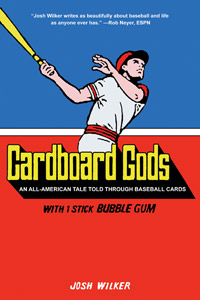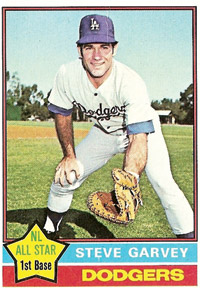
Readers of this site will know of my evangelism for Josh Wilker’s website, Cardboard Gods. That appreciation redoubled when I read his book, Cardboard Gods: An All-American Tale Told Through Baseball Cards, which I couldn’t recommend more highly to you all. It is at once entertaining and deeply affecting – kind of magical, really.
Wilker’s book tour reaches Southern California on Thursday with his 7 p.m. appearance at the South Pasadena Library, co-hosted by the Baseball Reliquary. (This takes place in conjunction with the Reliquary’s exhibit, “Son of Cardboard Fetish.”) This seemed like a perfect time to talk with Wilker about a few of the many things that make his writing so compelling:
A big part of Cardboard Gods that migrated from the site to the book is the importance of what you think a player’s pose or expression on the card is telling you. Obviously, these are guesses on your part, but do you think the photos on the cards are nevertheless windows to the gods’ souls – a veritable truth you wouldn’t necessarily get any other way? Or are they more just windows to our own souls?

Lookin’ sharp, Steve
I don’t know if they get me to any truths, but they definitely have always been able to get me to start wondering. The moments captured in my cards from the ’70s would seem to most people to be flat and trivial, the kind of thing that no one, not the player, not the photographer, not the great majority of people who would ever look at the card, could ever care much about. But because I cared about them as a kid, the stiff poses and enigmatic expressions continue to have a hold on me now, especially because many of them seem to include the same element of aimlessness and absurdity that has threaded through my post-childhood years. So they exist in two worlds for me, the adult world and the child world, and so it’s no wonder I’m drawn to them, since I’m an adult who has been kind of perpetually haunted and fascinated by his own childhood.
Aimlessness is an important theme in the book, especially after your brother put up boundaries between the two of you as he got older. But one thing about your family is that it seemed passionate about intellectual pursuits – your dad, your mom, Tom, even Ian with all the reading he seemingly did. And even in your aimless days, you were thoughtful and imaginative to say the least. How come that didn’t translate for you into more interest or dedication to schoolwork as a kid? Was life just too painful to allow you to focus on school, to allow that to be an outlet?



